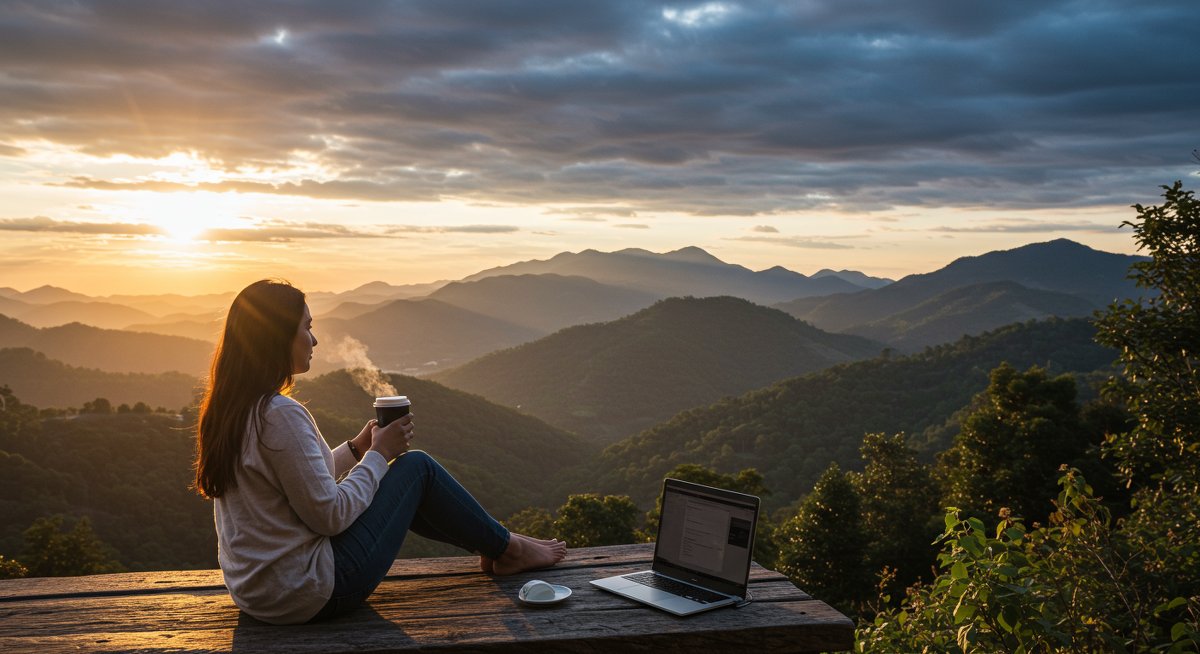
Why Embracing Mental Wellness Matters for Your Nomad Journey
The digital nomad lifestyle promises freedom and adventure, but it also presents unique challenges to our mental well-being. As aspiring digital nomads, you're likely drawn to the flexibility of working from anywhere, the chance to explore new cultures, and the opportunity to design your own life. However, the constant travel, potential for isolation, and pressure to stay productive can take a toll. This guide will equip you with practical strategies to prioritize your mental health and thrive on your nomadic journey in 2025. We’ll explore the common pitfalls, offer actionable solutions, and help you build a sustainable lifestyle that supports your overall well-being.
Consider this: you're working from a bustling cafe in Bali, the Wi-Fi is spotty, and your deadline looms. Or perhaps you're in a new city, struggling to build a social circle while combating feelings of loneliness. These are real-world scenarios that many digital nomads face. That’s why focusing on mental wellness isn’t just a good idea; it’s essential for a fulfilling and sustainable nomadic life. By proactively addressing your mental health, you'll be better equipped to handle the inevitable stresses, embrace the opportunities, and create a life you truly love.
Essential First Steps to Become a Digital Nomad
Before you even book your first flight, lay the groundwork for mental wellness. Planning ahead and setting realistic expectations are crucial. This involves preparing yourself both practically and mentally.
- Define Your 'Why': Clarify your motivations for becoming a nomad. Understanding your goals provides a strong foundation when challenges arise. Write down what you hope to achieve, whether it's creative fulfillment, financial independence, or personal growth.
- Build a Support System: Even before you leave, start cultivating connections. Join online communities, connect with other remote workers, and let your loved ones know your plans. A solid support system is vital for combating loneliness and stress.
- Financial Planning: Financial stress is a major contributor to mental health issues. Create a budget, save an emergency fund, and explore ways to manage your income and expenses effectively. Tools like budgeting apps and online banking platforms can be invaluable.
Example 1: Sarah, a graphic designer, planned her nomad journey for six months. Before leaving, she joined several digital nomad Facebook groups, connected with mentors online, and saved six months' worth of living expenses. This proactive approach significantly reduced her initial stress and allowed her to focus on her work and experiences.
Example 2: John, a software developer, took a month-long trial run, working remotely from a nearby city. This gave him a taste of the nomadic lifestyle and helped him identify potential challenges, such as finding reliable internet and establishing a work-life balance, before committing fully.
Common mistakes: Underestimating the importance of a support system and neglecting financial planning. Many aspiring nomads focus solely on the exciting aspects of travel and overlook the practical preparations that support mental well-being.
Expert Tip: Consider a "digital detox" day each week, completely disconnecting from work and social media. This helps you recharge and maintain a healthier relationship with technology.
Common Beginner Challenges & How to Overcome Them
Several hurdles are common among new digital nomads. Recognizing these challenges and having strategies to overcome them is crucial for maintaining mental health.
- Loneliness and Isolation: The lack of a stable social network can be isolating. Actively seek out opportunities to connect with others.
- Stress and Overwhelm: Juggling work, travel, and adapting to new environments can be overwhelming. Prioritize self-care and create a manageable work schedule.
- Burnout: The constant pressure to be productive and the blurring of work-life boundaries can lead to burnout. Set clear boundaries and prioritize rest.
Example 1: To combat loneliness, Maria, a freelance writer, joined a co-working space in her new city and attended meetups for digital nomads. She also scheduled regular video calls with friends and family back home to maintain her support network.
Example 2: James, a web developer, started practicing mindfulness meditation to manage stress. He also used a time management app to block off specific hours for work and leisure. This helped him create a balanced schedule.
Common mistakes: Trying to do too much, neglecting self-care, and failing to set boundaries. Many nomads fall into the trap of overworking and pushing themselves too hard, leading to burnout.
Expert Tip: Learn to say "no" to additional projects or commitments when you're feeling overwhelmed. It's better to focus on doing a few things well than to spread yourself too thin.
Tips for Success (e.g., budgeting, finding remote jobs)
Success as a digital nomad involves more than just finding a remote job; it requires a holistic approach that supports your well-being.
- Budgeting: Develop a realistic budget to manage your finances effectively. Track your expenses, set financial goals, and use budgeting apps to stay on track. Consider the cost of living in different locations.
- Finding Remote Jobs: Build a strong online presence to attract clients or employers. Network with other remote workers, use job boards, and hone your skills to increase your value. Websites like RemoteOK are helpful for job hunting.
- Time Management: Create a work schedule that aligns with your natural rhythms and allows for downtime. Use time-blocking techniques and productivity apps to stay focused and manage your workload.
Example 1: David, a virtual assistant, created a detailed budget using a budgeting app. He allocated funds for accommodation, travel, food, and entertainment, ensuring he stayed within his financial limits while still enjoying his travels.
Example 2: Emily, a social media manager, built a strong online portfolio showcasing her work and experience. She actively networked on LinkedIn and joined relevant Facebook groups to find new clients and remote work opportunities.
Common mistakes: Overspending, not setting clear work boundaries, and failing to prioritize self-care. These mistakes can lead to financial stress, burnout, and a decline in mental well-being.
Expert Tip: Regularly review and adjust your budget and work schedule to ensure they align with your goals and lifestyle. Be flexible and willing to adapt to changing circumstances.
Building a Sustainable Nomad Lifestyle
Sustainability means creating a lifestyle that supports your long-term well-being, both mentally and physically. This involves making conscious choices about your work, travel, and lifestyle habits.
- Prioritize Self-Care: Schedule regular time for activities that rejuvenate you, such as exercise, meditation, or spending time in nature. Self-care is not selfish; it's essential for your mental health.
- Create Boundaries: Set clear boundaries between work and leisure. Avoid working late into the evening and take regular breaks. This helps prevent burnout and promotes a healthy work-life balance.
- Build a Community: Connect with other digital nomads and build a supportive community. Share experiences, offer support, and create a sense of belonging.

Example 1: Alex, a content creator, dedicated one hour each morning to yoga and meditation. This helped him start his day feeling grounded and focused, improving his productivity and reducing stress.
Example 2: Jessica, a travel blogger, joined a co-living community. This provided her with a supportive network of like-minded individuals who understood the challenges and rewards of the nomadic lifestyle.
Common mistakes: Neglecting self-care, working excessively, and isolating oneself. These actions can lead to burnout, loneliness, and a decline in mental health.
Expert Tip: Regularly assess your lifestyle and make adjustments as needed. Be willing to change your travel plans, work arrangements, or living situation if they are negatively impacting your well-being.
Recommended Resources for New Nomads
Several resources can support your mental health and overall well-being as a digital nomad.
- Mental Wellness Apps: Apps like Calm and Headspace offer guided meditations, sleep stories, and relaxation techniques that you can access from anywhere.
- Online Therapy Platforms: Platforms such as BetterHelp or Talkspace provide access to licensed therapists for virtual counseling. This is a convenient way to receive support and guidance from a professional.
- Nomad Communities: Online forums, Facebook groups, and co-living spaces offer a sense of community and opportunities to connect with other nomads. These are great for sharing experiences, getting advice, and building your support network.
Quick Wins for Your First Nomad Trip
- Start with a short trip: This allows you to test the waters, learn what works for you, and adjust your strategy before committing to a longer journey.
- Pack mindfully: Bring items that promote relaxation and well-being, such as a journal, a favorite book, or aromatherapy oils.
- Embrace flexibility: Be prepared to adjust your plans and embrace spontaneity. The ability to adapt to unexpected situations is a key to enjoying the nomad life.
Next Steps in Your Location Independent Life
Embarking on a digital nomad journey is an exciting adventure, but it’s crucial to prioritize your mental well-being. By taking the first steps, addressing the challenges, and implementing strategies for success, you can build a fulfilling and sustainable nomadic lifestyle. Remember to be kind to yourself, embrace the journey, and seek support when needed. The freedom and flexibility of the nomad life are within your reach when you make your mental health a priority.